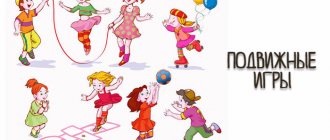"Traffic light"
On the site, two lines are drawn at a distance of 3–6 meters from each other - a road passes between them. The driver - the traffic light - stands in the middle of the road and cannot go beyond the lines. The rest are in front of the first line, and their task is to cross to the other side, that is, to end up behind the opposite line. The traffic light stands with its back to the players and makes a guess about the color: for example, it announces that it will only let red into the other side. Each player begins to look for some red thing on himself; its size and purpose are not important, and even a small spot on the pattern can be red. After some time (for example, after counting to ten), the driver turns around, and those who managed to find the right color present it to the traffic light and calmly cross the road. Everyone else is trying to run to the other side, but the traffic light catches them. The one he caught becomes the new traffic light. It makes sense for the driver to name unusual colors - lilac, turquoise, etc.: then there will be more of those who do not find such a color on themselves - and he will be able to catch a player to replace him.
"Looking for treasure"
You can keep children occupied not only with group games. There are a lot of great outdoor singles games out there. Don’t be bored because you came to the dacha without friends and brothers and sisters! Organize a fun activity for your child to find a mysterious treasure.
In the garden, gazebo or house, you can hide chocolates or a small gift purchased in advance in a box. Attach clues leading to the treasure to garden trees, swings or country lanterns. If the child cannot read, say treasure hunting tasks out loud: “Find a green wooden building, count 20 planks from left to right from the door, turn your back to the house and find an apple tree. On one branch you will find the thing that will lead you to the treasure.” Let the child complete different tasks and eventually find the treasured cache of candies.
Well, if you still have more than one child, you can play a real treasure island!
"Stander"
A half-forgotten game from the repertoire of pioneer camps. Judging by the name (most likely from Ständer! - “Stand!”), it was borrowed from a German game collection. To play you will need a ball. A large circle is drawn on the ground - all participants must fit into it. Then one person tosses the ball, calling the name of any other player. Everyone runs in different directions, and the named player leads. He catches or quickly picks up the ball from the ground, after which he shouts: “Stander!” - and everyone else must stop. The driver needs to knock someone out with the ball: he chooses his target (usually the player who is closest to him), takes three steps towards him and tries to hit him. He can cheat and step in one direction and throw the ball in the other so that the unsuspecting player does not have time to dodge. If the driver hits, then the “beaten” one receives a penalty point; if not, the driver gets a penalty point. In the next horse, the same driver throws the ball and calls the name of the player who will take his place. At the end of the game, the points are added up and the one with the least is declared the winner.
Hut or tent?
The hut at the dacha must be built, period! From branches or old bedspreads - it doesn’t matter. Or you can build a dream tent that will look like a summer house.
We will need:
- Gymnastic hoop
- Old sheets or pieces of fabric
- Ropes
The walls in our tent will be pieces of fabric, and the base will be a gymnastic hoop. Use a rope to hang it from a branch so that the edges of the fabric touch the floor. It is possible to provide a fabric roof in the tent.
If you spread a blanket next to the hut-tent and place sweets and fruits or pizza on it in plates, you will get a real picnic. All that remains is to invite children from neighboring dachas... You can be 100 percent sure that no one will be bored.
"Potato"
The players stand in a wide circle and throw the ball to each other. You can’t hold it in your hands: the ball is a hot potato! Those who could not hold the ball in their hands and let it fall to the ground also turn into “potatoes”: they go to the center of the circle and squat down there. The remaining players from time to time “spud” them, that is, they accurately throw the ball at those sitting (it is better to agree on the force of the impact before the game). The potato needs to catch the ball in the air - but you can’t stand up to your full height, you can only jump without straightening your knees. If you succeed in catching the ball, the potato stands in the circle again, and the player whose throw the ball was caught takes its place in the center.
Children play with a ball on the street. Moscow, 1959 © RIA Novosti
Shaggy dog (salky)
A type of salok. From 4 to 10 people can participate. The leading “dog” turns his back on the other participants. The rest of the players read the poem:
Here sits a shaggy dog, with his nose buried in his paws. Quietly, peacefully, he sits, Maybe he’s dozing, maybe he’s sleeping. Let's go up to him, wake him up and see what will happen?
Children approach the “dog” standing with his back. He turns, “barks, bites” and catches the participants. The one who is caught becomes a “dog”.
"I know five names"
The first player hits the ball from the ground with his hand, while saying: “I know five names of girls: Katya, Tanya, Sveta, Olya, Yulia...” You must speak quickly and rhythmically, for each word you must hit the ball with your hand. If the player is not lost, he continues: “I know five names of boys: Vanya, Kolya, Petya, Sasha, Misha...” Then, in the same way, you can continue to name five of everything that comes to mind: the names of cities, rivers, animals, trees, birds, car brands (some determine the sequence in advance, others create it on the fly). If a player loses the ball, makes a mistake, or takes too long to come up with an option, then the ball is passed to the second player, and he starts over: “I know five names of girls...” Repeating the same names and names is not interesting! When the ball, having made a circle, returns to the first player, he starts from the topic on which he lost his way. You can play “I Know...” not only with a group, but also with two people or even alone.
Mud kitchen
But please don’t scold your child for his grimy appearance. Take this with humor. What's for lunch? Sushi, pasta or cold drink? Let your little cooks choose from the menu and make make-believe dishes. Mud Kitchen is a great game that develops imagination. Children can prepare “foods” from mud and sand, leaves, flowers, and pebbles. By the way, recently this fun has found a second wind, becoming popular again - the Instagram feed is replete with children's masterpieces.
Help your child collect the necessary “products” for cooking: pour water into a bucket and create a source of dirt (dig a hole in the area and fill it with water). Collect plant inflorescences, leaves, cones - everything that is useful as a decoration for dishes.
Such games are useful not only for parents (you can do gardening or barbecue), but also for children: firstly, the immune system is strengthened, and secondly, fine motor skills are developed, not to mention imagination.
"Twelve Sticks"
One of the varieties of hide and seek, but with an interesting complication. Before the start of the game, participants choose a driver and build a special structure: a board is laid on a stone, brick or other object of suitable size so that one end of it lies on the ground and the other is raised up. Twelve small sticks are placed on the lower end of the board (pencils or brushwood can be used), and then, using the board as a lever, one of the participants scatters them. While the driver collects sticks, the players hide. Then, as in standard hide and seek, he goes to look for those hiding and, if he finds them, he snitches, that is, he runs to the base. Or, as the driver’s place was previously called, to the “con” or “fat”. and shouts something like “Knock-knock for Petya!” The essence of the complication is that during the search you must not forget to guard the structure made of sticks: the discovered player can run to the board before the driver and destroy everything (at the same time he must shout: “I broke it!”). Any other player can do the same if he notices from cover that no one is guarding the base. If the sticks are scattered, then the driver must give up searching and reinstall the structure, and the one who scattered the sticks and the other players hide at this time. It is quite difficult to get rid of the role of the driver in such a game.
Drawing with prints
You can draw with almost anything that can leave an imprint - natural materials (leaves, flowers, pine cones), fabric of different textures, threads, palms, feet. With this type of activity, children develop imagination, motor coordination and creative thinking. The drawings turn out very bright and unusual.
What we draw on: a piece of unnecessary wallpaper, whatman paper, an old white sheet (by the way, a sheet for a tent will do!).
What we paint with: watercolors, gouache.
What natural materials will be needed: everything you find - leaves, flowers, fruits, pine cones, etc.
For example, have your child try applying paint to a piece of wood and stamping it on white paper. Different textures leave different imprints. If you use a piece of wallpaper as a canvas, you can paint all day long.
You can even create masterpieces with soap bubbles. Pour a special solution for bubbles (can be made from dishwashing detergent) and paint into a jar of water. Using a straw, “gurgle” the foam. Place the bubbles against whatman paper. When the first patterns begin to appear, lift the paper. Bubble patterns are ready.
"Ring"
This game is very old, known as "Bury Gold" since at least the early 19th century, but most likely existed much earlier. The game “Burying Gold” was part of the Yuletide entertainment for young people, especially girls: the song that accompanied the action was filled with marriage images (a tower, a viburnum-raspberry, a light brown braid, a ring falling to a young nobleman) The lyrics of the song were, for example, like this : “I’m already gold / I’m burying, I’m burying, / I’m burying pure silver. / I’m with my father in the mansion, in the mansion, / I’m with my mother in the high, high. / The ring fell, the ring fell / Into the viburnum-raspberries, / Black currants; / The ring ended up / Yes with the nobleman, / Yes with the young man / On the right hand, / On the right little finger. / Guess, guess, girl, / In which hand was the girl, / Walking across the field, / Weaving a braid into Russia, / Weaving in silk, / Weaving in gold, / The girl was guessing, but didn’t guess. / You are my girlfriends, you are mine, you are mine, / You tell me, don’t hide, / Give me my gold: / My mother will beat me / Three mornings, four, / Three golden rods, / Fourth pearl. / The girls guessed, but didn’t guess; / Gentlemen of the nobility, guess for yourself” (A. V. Balov. “Russian round dance”. Round dance games in the Yaroslavl province / Northern Bulletin. St. Petersburg, 1889. No. 6). and could be performed during fortune telling. By the end of the 20th century, the game lost the long song, the connection with Christmas time and the magical meaning, only the action and the name of the game item remained - the ring. Although a ring is not necessary: “Ring” can be played with any small object - a coin, a button, a paper clip, etc. Participants sit in a row, fold their palms like shell flaps, and hold them in front of them. The driver, who has a “ring” in his hands folded in the same way, approaches everyone in turn and lowers his hands into the player’s hands. He places a “ring” in the hands of one of the players, trying to do it unnoticed. The one who got the “ring” also tries not to give himself away. The others, in turn, watch carefully, noticing who is behaving unusually and suspiciously. After all the players have been bypassed, the driver steps aside and says: “Ring-ring, go out onto the porch!” The player with the “ring” quickly jumps up and runs towards him. Other players, especially if they realized in advance who has the “ring,” try to grab it and hold it in place. If the player with the “ring” manages to escape, then he leads the next horse; if not, the previous player remains leading.
At the playground. 1981 © Vitaly Karpov / RIA Novosti
How to decide to move to a dacha with children
Moving to a dacha with children is, of course, a responsible matter: a child needs good living conditions all year round, and children also need constant supervision from their mother or other relatives. But all problems can be solved if you approach them correctly:
- Make sure in advance that the house has at least minimal amenities: electricity and water supply. If you choose a cottage or house for rent, check with the owners whether the house has the necessary communications: there must be an electricity supply and an accessible source of water, for example, a nearby common well or a well on the site;
- think about how your children and you will maintain hygiene - choose an area with a bathhouse or a house with a shower;
- Internet and television are now not a problem even far from large cities: you can use wireless Internet services from any cellular operator, and buy a set-top box or satellite dish for television;
- Find out how things are with medicine in the gardening partnership: the nearest clinic or hospital should be as close as possible, 10-20 minutes away by car.
Don't worry about your child when he walks without your supervision. Always know where he is, what route he's taking and what's going on around him with the Where's My Kids app. Let country life bring only joy!
The real experience of a mother of many children
Still doubt whether you can cope with children far from civilization? Our heroine today, Yana Kostina - mother of three children, writer, businesswoman, author of a blog about psychology and development - shared her experience and gave recommendations to parents:
“I’ll share my many years of experience staying at the dacha with children in the summer. Going for the first time with my still small daughter (3.5 years old) and son (11 years old), I had no idea how many interesting discoveries I would have, how many useful things the dacha would give me in terms of raising and developing children.
Moving to the countryside for the summer months greatly changes many aspects of the life of both mother and child. Especially if we are talking about a holiday not in a dacha with all the amenities, but in an average area, which includes my dacha - where there is no dishwasher or washing machine and an unlimited amount of hot water. Spending the whole summer in such conditions is another test...
The first thing you need to understand: you don’t need to put a lot of effort into coming up with various games and activities, or bring a bunch of educational toys from home for your children. I realized that it is enough to simply trust the child’s imagination, support him in his fantasies, although taking care of safety.
There are so many new and unusual items at the dacha! Yes, any stick turns into a horse, then into a “digger,” or into a magic wand. And a dacha is usually a warehouse for old things. Oh, what a pleasure it is to sort through objects from your childhood with your child. There are so many stories to tell, so many interesting questions to ask!
Games with your child can be organized from almost any activity in the country. And even turn washing dishes into an exciting joint activity. My little daughter happily helped me, pouring water from a jug, pretending to be a water tap. This “faucet” was turned on with the words: “please pour some water.” And then there was a game of “rubbing the dishes with a towel” so that the good cups and plates would kindly agree to serve delicious food next time.
In general, I quickly realized that it is possible and necessary to involve children in household chores if everything is presented in the format of an exciting game. And, of course, you must be prepared to answer 1500 “why?” questions. By satisfying the child’s need to explore the world, we develop cognitive abilities.
But mom also needs “her own” time for rest and, possibly, for work. A small inflatable pool in the yard, a slide or a swing will help keep your child occupied for several hours. I was also lucky with the difference in the ages of my children. The eldest son could look after his younger sister with full responsibility for a couple of hours.
Go to your dacha with confidence and pleasure! Small everyday inconveniences are more than compensated by fresh air and great opportunities for raising and developing a child. And the memories of your summer vacation will last a lifetime!”
If you still want to take care of more varied and unusual leisure time for your child, we have collected for you the most interesting games and entertainment, as well as some tips on arranging a summer cottage space.
"Water"
A type of blind man's buff that is suitable for limited courtyard spaces - a delineated area, an area in front of a house with a fence. Players choose a driver - a merman. He squats down, blindfolds his eyes and hides his face in his knees, the others put their hands on his head and walk around saying: “Water-Water, why are you sitting under water? Come out for a minute, just a second!” Having finished reading the poem, everyone scatters in different directions, and the driver stands up and shouts: “Stop!” Players freeze in the place where the team caught them and must not move from it. Trying to dodge the hands of the driver, they can squat, lean in different directions, or stand on one leg. Having grabbed the player, the driver must recognize him by touch and call him by name. The caught player leads the next horse. The merman, with his eyes closed, looks for players, focusing on sounds, so the players try to stand as quietly as possible, without puffing or laughing (which is quite difficult!).
water wall
Using all kinds of containers and hoses, a wall is built along which water can be directed so that it passes through all obstacles.
Playing by the book
Share & Remember
Bouncers
Dodgeball is one of the most popular school games and is even sometimes played in physical education classes. Two drivers stand on opposite ends of the court and throw the ball (it is better that the ball is not very heavy), trying to hit the players moving freely between them. If the driver manages to knock out the player, he is eliminated from the game. The last player remaining on the field must dodge the ball as many times as his age plus one. If successful, the whole team returns back to the site. If he is hit, the player changes with the driver who knocked him out. According to other rules, the eliminated player does not leave the field, but immediately changes with the one who made a successful throw. The game also has a number of interesting details and complications (figures or pictures). For example, a “candle”: if a player managed to catch the ball on the fly, he receives an extra life and has the right to remain on the field when knocked out; The “candle” can be transferred to another and thus returned to the team member’s field. Also, the drivers, when making a throw, can give the players a task: “bomb” - and everyone squats down and moves while sitting, “wall” - line up in a row, “stream” - stand one after another, legs apart, and the ball rolls between the players’ legs , and etc.
Family at the dacha in summer: pros and cons
There are many advantages to a summer holiday with the whole family. There are, of course, disadvantages, but most of them are easy to eliminate.
So, about the advantages of summer at the dacha with the whole family:
- the environment is better than in the city: clean air and, possibly, a forest or lake nearby;
- more space than in an apartment: you don’t have to worry about parking and walking even with very young children - just make sure that the baby doesn’t go outside the area;
- healthy physical activity for children and parents: cleaning the site, caring for flowers, trees or other plants;
- savings: a summer holiday at the dacha will be much cheaper than a trip to a resort, or even staying in a city apartment - you won’t have to pay for expensive tours, and utilities will cost a more modest amount compared to the city;
- the ability to use the area near the house at your own discretion: for example, as a garden with exclusively ornamental plants, as a vegetable garden with healthy vegetables, or as a large sports ground;
- life - at least for three months - without close neighbors and fear of disturbing them in any way;
- varied recreation: you can have picnics with your family, play active or calm games, sunbathe right on the site;
- During an epidemic, it is safer to be in a private country house than in a city apartment - the concentration of people in dacha communities is lower, therefore, the likelihood of becoming infected is lower.
Disadvantages of holidaying at the dacha in summer:
- possible difficulties with amenities: electricity is now available almost everywhere, but hot water, an indoor toilet, Internet and television are not available in every dacha;
- distance from the city and, accordingly, from the place of work;
- lack of medical facilities nearby if the holiday village is not large enough;
- Preschoolers and primary schoolchildren, if they are occupied with interesting things, relax in the country with pleasure, but teenagers may become bored if their peers are not found in the neighborhood.
And one more difficulty that is relevant when borders are closed: if you do not have your own dacha and you plan to rent it, you will have to try to find a suitable plot. According to Avito, the demand for renting country houses has skyrocketed by as much as 90% compared to last year.
Confusion
The driver steps aside and turns away. Participants stand in a circle facing each other, hold hands and begin to get entangled: someone crawls under someone else’s hands, someone steps over their neighbor’s hands, someone turns around themselves - all this must be done without uncoupling. After the players decide that they are sufficiently confused - usually by this time they are already standing close to each other, intertwined with their arms and legs - they call the driver, who must untangle them. You need to unravel it in such a way that the knot turns back into a circle, while the hands of the players cannot be separated. The point of the game is more about interest than about the victory of the driver or the “confused” people, so it is recommended to give the driver tips. In some variants, if the chain of players breaks during untangling, they run away and the driver catches them, as in a catch-up game.
Children on the school playground. England, 20th century © Hulton-Deutsch Collection / Corbis / Getty Images
Games with available materials
Three-handed tripod
Relay races are ideal competitions for games in large groups to involve everyone. You can diversify them by making two players into one inextricable team, tightly tying them together by the legs or arms with a rope.
You need to tie it so that the right leg (arm) of one player is attached to the left leg (arm) of the second. And then you will need to complete tasks with only three common limbs.
Each pair must pull out, like a phantom, a note with a task that will be performed by three limbs: pull the awning, collect firewood, arrange dishes, make sandwiches, make a fire, string kebabs on a skewer, etc. You can diversify the draw, and the players will pull out not only the task, but the way of binding.
An insidious burden
This game is easy to organize in the field using available props. The task is to race to deliver food through obstacles to the finish line and not lose it along the way. But it needs to be delivered in an unusual way - on the toes of shoes.
To do this, pass an elastic band or string through plastic cups and tie them to the toes of the players' shoes. Then fill the cups to the brim with crackers, popcorn, and candies and announce the start. Whoever gets to the finish line the fastest and also loses the least amount of food is the winner. Despite its apparent simplicity, this delivery method is very complex.
"Granny's pantaloons"
Participants sit in a row. The driver tells, composing as he goes, a story, for example: “I got up early this morning, looked out the window, and in the sky...” - at a key moment he falls silent, giving the floor to one of the players in turn. Players must say the same thing every time - “grandmother’s pantaloons”:
- I washed my face, dressed in... -... my grandmother’s trousers. - And went for a walk. I came to the forest, and there on the tree... -...grandmother's pantaloons.
And so on. In another version, the driver does not tell, but asks the players one by one questions:
- What's in your backpack? - Grandma's trousers.
At the same time, none of the players should laugh - this is quite difficult. The one who laughed changes the driver and leads the story further.
Should adults help children play?
And it depends on what kind of children they are. Ten-year-old and older children do not need adult help in this matter; it will only disturb them. At this age, children themselves will cope well with both games and their rules, and they will build relationships with rivals and play partners.
Another thing is 5-8 year old children. This is where the participation of adults will definitely come in handy. In particular, in this case, adults will help:
- gather children for play;
- distribute them among teams;
- explain the rules;
- to be referees in the game;
- monitor the playing process to ensure that children comply with safety rules.
Well, now – more about the games themselves. An innumerable number of them have been invented over the centuries, so it is impossible to talk about all the active children’s amusements in one article. We will tell you only about some of the most exciting and useful summer children's outdoor games.
Cossack robbers
This game has been known at least since the mid-19th century. It had different names (“Cossacks and Bashkirs”, “Russians and Chechens”, etc.), but the essence of the game in both the 19th and 20th centuries came down to approximately the same thing: participants are divided into two teams, one of which it hides, and the second searches for and attacks those hiding. In the most famous version, Cossack-robbers are similar to team hide-and-seek: the searching team (Cossacks) counts down the time, while the other (robbers) comes up with a secret password and runs away, leaving traces along the way - arrows drawn in chalk on the asphalt, indicating the direction of their movement. Those running away try to confuse their opponents: they draw arrows very pale, in inconspicuous places; At intersections they draw a cross with four arrows so that pursuers do not know where to turn. The robbers hide for 10–15 minutes, during which time the Cossacks determine the dungeon - the place where they will torture the other team to find out the password (it is worth agreeing on the methods of torture in advance: the most humane thing is to tickle or force them to squat). If the Cossacks find out the password, they win. According to some rules, captured robbers can be released: members of one team attack the Cossack guard and hold him, the prisoners scatter (the guard can scream and call for help). This variant of the game is also known: the password word is guessed according to the number of robbers (for example, 7 players - 7 letters), each is given a letter. The robber in the dungeon is obliged to tell the Cossacks his letter, and recovering the password becomes easier and more interesting.
Why children need to play more
The answer to this question is simple. The game has a special meaning for children; with its help, they acquire many necessary skills:
- learn to be part of a group or team;
- develop leadership qualities;
- communicate and find a compromise;
- learn to survive failures (after all, in every game there is a winner and a loser);
- cultivate willpower and ingenuity;
- sharpen agility and strength, gain endurance. Outdoor games are very good for children's health.
And in general, this is a well-known fact: children comprehend life in all its meanings and manifestations through games. Someone will say that all kinds of computer “shooters” and “tanks” are also games. That’s how it is, but they (and this is also a well-known fact) for various reasons bring much more harm to the child than good. Unlike the same old and good outdoor games.
Therefore, children should play and move as much as possible. This is the golden rule of life.
"Olympics"
You can jump with a rubber band, or you can play “Olympics” with it. Two people hold the rubber band from different sides and tangle it, crossing their arms, stepping on their feet and saying: “O-lim-pi-a-da, eat three I-da, fi-nish, start!” The result is a design reminiscent of a laser alarm. The remaining participants must take turns climbing through the largest holes without touching the elastic bands. The one who touches replaces any of the players holding and tangling the rubber bands.
A kindergarten group on a walk. Primorsky Territory, 1979 © Boris Kavashkin / RIA Novosti
A foam party
For such a holiday you will need baby foam “without tears” or shaving cream.
One Charming Party
Life Made Lovely
Boyars
This game combined two ancient games: the song came from the game “Boyars” from rural and merchant youth parties, and the action came from the boyish “Forged Chains” (another name is “Shackles”). Both children and adults participate in the game with great pleasure, primarily because of the funny text (in the traditional “Boyars” it is less funny - Boyars! what have you come for? / Young people, what have you come for? - Princesses! Yes, we are looking for brides! / Young, yes, we are looking for brides! - Boyars! show the groom, / Young, show the groom. - Princesses! This is our groom! / Young, this is our groom. - Boyars! Show us the caftan, / Young, show the caftan. - Princesses! This is our caftan! / Young, this is our caftan. - Boyars! Show us the sash! / Young, show us the sash! - Princesses! This is our sash! / Young, this is our sash. - Boyars! show the boots, / Young, show the boots. - Princesses! this is our boot, / Young, this is our boot. - Boyars! cheer up! / Young, with the whole train! (E. A. Avdeeva. Notes and comments about Siberia: with an appendix of ancient Russian songs. M., 1837). The participants of the game are divided into two equal teams, which stand in two ranks opposite each other, the players join hands. The teams begin to sing a question-and-answer song (in chorus, one at a time) and alternately take a few steps towards their opponents, then the same number in the opposite direction. When answering a question, one team goes forward, and when answering, the second team does. The first team starts:
- Boyars, we have come to you! (They go forward.) Young people, we have come to you! (They go back.) - Boyars, why did they come? (They go forward.) Young people, why did you come? (They go back.) - Boyars, we need a bride! Young people, we need a bride! - Boyars, which one do you need? Young people, which one do you need? - Boyars, we need this one! (They point to one of the players of the other team, agree in advance which one; gender does not matter.) Young people, we need this one! - Boyars, she is our fool! Young people, she is our fool! - Boyars, we’ll give you some gingerbread! Young people, we’ll give you some gingerbread! - Boyars, her teeth hurt! Young people, her teeth hurt! - Boyars, we’ll take you to the doctor! Young people, we’ll take you to the doctor! - Boyars, she will kill the doctor! Young people, she will kill the doctor! - Boyars, and we whip her! Young, and we whip her! - Boyars, she is afraid of the whip! Young people, she's afraid of whips! - Boyars, don’t play the fool, give us the bride forever!
After these words, the selected player runs up and tries to break through the clasped hands of the opponents. If he succeeds, he can take one of the strangers into his team; if not, he himself joins another team (“gets married”). The team with only one player left lost.
How to organize life at a summer cottage for a family with children
When going to the dacha with your children for quite a long time, try to immediately take everything you need with you, so that later you don’t have to return for forgotten, but so necessary things. The main thing that you need to think about before the trip is what exactly you will need to solve everyday and work issues, and to create conditions in which the child will be comfortable.
List of the most necessary things for life in the country:
For children
Toys, stationery, board games, phone or tablet, ball.
For good health
Emergency supplies: disinfectants, antipyretics, burns, allergies, bandage, thermometer.
For everyday life
Portable electric stove, fan heater for cold nights, lantern, candles, water filter, insect repellent, bed linen, towels, electric kettle, iron.
Groceries (if there is no grocery store nearby)
Canned meat, fish, vegetables, spices to taste, tea, sugar, cereals, sweets with a long shelf life.
Clothes and shoes
Light clothing and warm clothes for cool evenings, swimsuits, swimming trunks, hats, open and closed shoes.
For hygiene
Soap, toothpaste, shampoo, sunscreen cosmetics, washing powder, wet wipes, toilet paper.
Home improvement
Read more about how to arrange life in the country:
- make sure that the cottage or house has things that are important for life, but difficult to transport: refrigerator, beds, tables, other necessary furniture;
- if the house has electricity, it’s enough to take with you a supply of candles and extension cords; if you couldn’t find a house with electricity, and you’re ready to spend money, use autonomous sources of electricity: solar panels (from 4,000 rubles) or a wind generator (from 8,000 rubles);
- For quick cooking, a slow cooker or small microwave works well. If you want to save on electricity, cook on a gas stove. Even if there is no gas at the dacha, one filled cylinder will still last for the whole summer;
- Hot water in nature usually appears by itself, heating up in the sun - just pour cold water into a large container. In case of rainy days, stock up on a compact water heater.
Job
If your children are over three years old and your mother has already returned from maternity leave, try to resolve work issues in advance so that one of the adults always stays with the children and there is an opportunity to get to work without problems. There are several ways to resolve work issues:
- Perhaps adult family members will be able to take turns taking vacations.
- When renting a dacha, pay attention to its transport accessibility - it’s good if there is a train station nearby so that adult family members can get to work without traffic jams. When going to work by train, choose trains departing from your station or from the one closest to it, otherwise you risk being stuck for the entire trip.
- You can try to negotiate with your boss about remote work. If your specialty does not allow you to work remotely, you may be able to soften your work schedule, freeing up more time for your family.
Children
It makes sense to collect children's things separately from adults - usually a child needs more comfort and entertainment in nature than his parents. Be sure to find out from your son or daughter what things they want to take to the dacha, so that later you don’t have to return for your favorite bear or doll.
If you plan to live in the country with a child under three years old, do not forget the most important things:
- stroller;
- feeding and water bottles;
- favorite rattles;
- hygiene products designed specifically for babies;
- pot;
- baby monitor;
- a supply of light and warm diapers and clothing; baby blanket; closed shoes if the baby is already walking;
- diapers.











